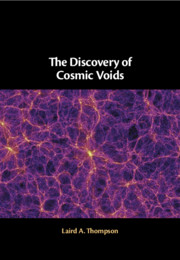Book contents
- The Discovery of Cosmic Voids
- The Discovery of Cosmic Voids
- Copyright page
- Dedication
- Contents
- Foreword
- Preface
- Acknowledgments
- Abbreviations
- 1 Understanding the Foundations of Modern Cosmology
- 2 Preview of the Discovery of Cosmic Voids
- 3 Homogeneity of the Universe: Great Minds Speak Out
- 4 All-Sky Surveys in the Transition Years 1950–1975
- 5 The Early Redshift Surveys from Arizona Observatories
- 6 Galaxy Mapping Attempt at Tartu Observatory
- 7 Theoretical Models of Galaxy Formation – East versus West
- 8 Priority Disputes and the Timeline of Publications
- 9 Impact of Cosmic Voids: Cosmology, Gravity at the Weak Limit, and Galaxy Formation
- Book part
- Notes
- Biographical Sketches
- References
- Index
3 - Homogeneity of the Universe: Great Minds Speak Out
Published online by Cambridge University Press: 02 December 2020
- The Discovery of Cosmic Voids
- The Discovery of Cosmic Voids
- Copyright page
- Dedication
- Contents
- Foreword
- Preface
- Acknowledgments
- Abbreviations
- 1 Understanding the Foundations of Modern Cosmology
- 2 Preview of the Discovery of Cosmic Voids
- 3 Homogeneity of the Universe: Great Minds Speak Out
- 4 All-Sky Surveys in the Transition Years 1950–1975
- 5 The Early Redshift Surveys from Arizona Observatories
- 6 Galaxy Mapping Attempt at Tartu Observatory
- 7 Theoretical Models of Galaxy Formation – East versus West
- 8 Priority Disputes and the Timeline of Publications
- 9 Impact of Cosmic Voids: Cosmology, Gravity at the Weak Limit, and Galaxy Formation
- Book part
- Notes
- Biographical Sketches
- References
- Index
Summary
Astronomers in the past clearly recognized the irregular nature of the galaxy distribution in the nearby Universe. Both Herschel (ca. 1800) and Shapley (ca. 1932) detected and described these effects. They both named specific regions in the sky that are crowded with galaxies and other regions that are significantly deficient in galaxies. However, the scientific views of Hubble published in 1936 overshadowed these early results, and based on his beliefs (with no significant substantiating evidence) Hubble asserted that the Universe (both locally and at great distances) is isotropic and homogeneous. Hubble’s 1936 analysis used counts of faint galaxies to show that the Universe – with galaxies as designated “markers” in space – extends in depth to the greatest limits he was able to obtain at Mt. Wilson Observatory. In the 1930s, Holmberg and others set the foundation for hierarchical structure formation to explain the origin of groups and clusters of galaxies.
Keywords
- Type
- Chapter
- Information
- The Discovery of Cosmic Voids , pp. 36 - 57Publisher: Cambridge University PressPrint publication year: 2020



